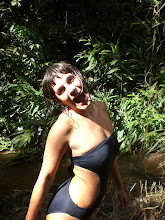'Nuff said.
We stayed two nights camping in Cap Estérias, outside Libreville, with a guy who called himself Jack Daniels. Each night consisted of many a tall cold beer produced from somewhere in the bush, some sort of tasty avec type meal, and JD showing some true African style hospitality. JD’s place is about five minutes from the beach where a handful of French expats and diplomats loaf about at two exorbitantly overpriced restaurants. He’s building bungalows to rent out to travelers, and since the road to the area is undergoing a massive pavement project (currently it is all mud and potholes), by the time his place is finished he should have a good stream of people coming through.
After some hassle from the Republic of Congo Consulate, we got our visas sorted for the Congo and the Democratic Republic of Congo* and hit the road South. We slept one sweaty uncomfortable night in the trucks and had to pass numerous check points before getting to the Congo where, again, we ran into several checkpoints and had about three “official” entry passes stamped into our passports (everyone wants to make their mark!).
Passing through the Congo is beautiful, though a bit tragic. The road winds and rolls through grassy fields and naked mountains where lush jungle ought to be before bouncing into the remaining dense jungle in the mountains between Dolisie and Pointe Noire. Our first night we camped in a Makonga village about 100km from the Gabonese border. We pulled up and said, “So the road ahead is pretty rough and it is getting dark…” and a guy who looked a little like Ice Cube said, “Well then, stay here for the night!” We drank palm wine, smoked cigarettes and shared some of our dinner with our new friends who, for the most part, just stood curiously watching us and tentatively asking questions in French about what we were up to.
The next morning we left early to head towards the DRC border. We were stopped, fortunately, at a checkpoint at the Dolisie/Pointe Noire crossroads and discovered that we had punctured a tire and it was quickly going to be flat. A truck pulled up with a white passenger who said a brief “Hello” and introduced himself before ducking into a store to purchase some Cokes. Andre ended up being the first in a series of South African telecommunication saviors we’ve encountered here in the Congo. He passed us on to his associate, Derrick, who immediately began “organizing” for us. We camped out in the company warehouse, showered in his hotel room, and were directed to head to Pointe Noire where we would be met by Kristo who would show us to the ex-Minister of Defense’s mansion, the company hang-out, before Junel tried to help us sort out Cabinda and Angola visas.
Getting to Pointe Noire was a bit more of a challenge than expected, though. The road passes through dense steaming jungle in the mountains and appears to mainly be used by huge logging trucks. We passed convoys of Chinese trucks carrying road building equipment—apparently China will be building nice tarred roads in the Congo in exchange for access to timber and oil. Hmm.
We ended up slip sliding our way to Pointe Noire in about eight and a half hours (its only about 175km, which should take about half that time). It started to downpour less than halfway into our journey, and the road turned into buttery mud that proved to be quite treacherous. There was a point, when Steve Shoppman and I were sliding almost out of control down a steep hill with a huge drop off on one side that I thought how crazy this adventure is. We survived, though, and only once had to carefully maneuver one of the trucks out of a sticky situation. In Pointe Noire we met up with Kristo and were taken to the marble mansion, complete with wifi, satellite TV and a pool.
That is where we are now—trying to figure out where we can go from here. Cabinda/Angola is going to be a challenge to get to. Our visit to the consulate today was completely unsuccessful, with the guard at the gate refusing to even let us in since it was “prohibited” to get a tourist visa for overland travel in Angola. We’ll see.
*(if you are confused about the difference, the Republic of Congo, also known as Congo-Brazaville, is an ex-French whereas the DRC, formerly known as Zaire, was a Belgian colony and has one of the bloodiest and heartbreaking histories I’ve heard yet in Africa. For more information check out the descriptions of the DRC in Tim Butcher’s book Blood River: A Journey to Africa’s Broken Heart)

No comments:
Post a Comment